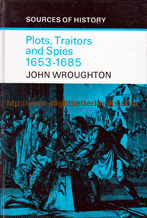

Slightly Better Books
Author Focus:
History - 17th Century
 |
Home | Contact | About Us |  |
|||||||||||||||||||||||||||||
|
|||||||||||||||||||||||||||||||||
| |
|||||||||||||||||||||||||||||||||
| History - The 17th Century | ||
| In Pictures: | ****Hyperlinked titles will take you to our copy on sale or prebuilt searches of copies on sale****
Useful Links: [in ascending order of date of publication (year) with each entry dated to earliest edition. Each listing includes later editions and printings] 1970. Plots, Traitors and Spies 1653-1685 |
On Amazon: |
 1970, Macmillan, hbk In stock, good condition, click image above to purchase through Amazon UK. Price: £10.99, not including post and packing, which is Amazon UK's standard charge of £2.80 Alternative online retailers to try: Click here for our prebuilt search for any edition of this title on Alibris Click here Click here to access our prebuilt search for this title on Biblio |
Contents:
List of Illustrations: About this book/synopsis: Every century throughout history has produced its crop of plots, traitors and spies. These are far more likely to flourish, however, under certain suitable conditions. Today the emerging countries of Africa and South America are much more promising breeding grounds for traitors than the longer established states of Western Europe. An unpopular, oppressive or unjust government is often a challenge to the potential plotter - especially if the chances of removing that government by lawful means seem remote. Thus in 1820, when few people in Britain had the vote, the Cato Street conspirators devised a plan to murder the whole Cabinet. Nowadays, however, the British electorate knows that it will only have to wait for five years at the most to remove an unpopular government from power. In the meantime, it can voice its discontent through the mouths of the opposition in parliament. Plots in Britain are no longer necessary. But in the middle of the seventeenth century, parliament was still struggling to assert its powers and was at the mercy of rulers for call and dismissal. Troublesome parliaments were quickly sent home - by Cromwell as much as by Charles II. Other means of protest therefore had to be found. Traitors are also bred by unstable or new types of government. Following any revolution (such as the one which despatched Charles I from the throne of England in 1649), there is an unsettled period of tension, fear and suspicion. Plots thrive in this atmosphere. The supporters of the ousted ruler seek revenge. Some of the followers of the new ruler, on the other hand, become either jealous or disappointed by his success and failure. Power tends to corrupt a newly arrived government swept in by the sudden tide of revolution. It loses its ideals in the face of reality; it is compelled to establish itself by forceful mean. Its former supporters are quickly disillusioned and feel betrayed. All these conditions were present in England between 1653 and 1685. Ambition and Revenge waited on the sidelines (or perhaps on the Continent) to seize their opportunity. Governments were new, unstable and unpopular. But they were also efficient. Their well-trained spies searched out the would be rebels. Well-trained militias and well-trained executioners did the rest |
|
|
[top] | |
| [top] | ||